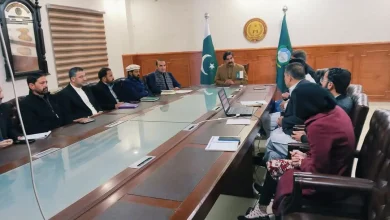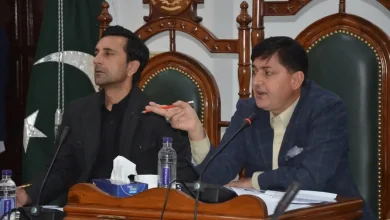Mian Iftikhar Hussain, Provincial President of the Awami National Party (ANP), highlighted the party’s significant contributions to Khyber Pakhtunkhwa’s development. Despite facing severe terrorist attacks, the ANP has established universities, hospitals, colleges, and infrastructure, demonstrating their commitment to the region’s growth.
The ANP leader encouraged students to avoid slogan-based politics and instead focus on meaningful action. He emphasized the importance of education and critical thinking in shaping the region’s future. Hussain’s statement came during the oath-taking ceremony of the Pakhtoon Students Federation’s newly elected cabinet, where party provincial general secretary Hussain Shah Khan, Muhammad Riaz Khan Battagram chapter president, Ayaz Khan Torkhail, other PSF and party workers were present.
Hussain criticized the current state of affairs, stating that terrorists are present in every corner of the province. He alleged that the government has failed to protect its citizens, citing the Chief Minister’s admission that police and government officials are restricted from traveling at night. This, Hussain argued, is a clear indication of the government’s inability to maintain law and order.
Also read: Civil society deplores ICT law curbing right to peaceful assembly
The ANP leader urged the people of Hazara Division to identify those loyal to the soil and to put their trust in the ANP. He emphasized the party’s sacrifices, including the loss of over 1,000 workers in the fight against terrorism.
Hussain stressed the need for unity and a single solution to bring peace to the region. He advocated for the implementation of Bacha Khan’s ideology, which promotes non-violence and peaceful resistance. Notably, Hussain mentioned that America is teaching Bacha Khan’s anti-violence ideology in several states, highlighting the global relevance of his philosophy.
Hussain emphasized the need for unity, collective action, and a commitment to non-violence. The ANP’s sacrifices in the fight against terrorism demonstrate their dedication to the region’s growth and development.
Bacha Khan’s ideology emphasizes the importance of non-violence and tolerance. Our aim is to eradicate hate and promote tolerance in society. The Pakhtoon Students Federation (PSF) strengthens the hands of those workers who are honest in their commitment to Bacha Khan’s ideology.
Recently, a meeting was held between the heads of political parties and representatives with the army chief to discuss a uniform policy for peace in Khyber Pakhtunkhwa and the region. This is a positive step towards achieving peace, as it acknowledges the need for a collective approach to addressing the challenges facing the region.
We have long advocated for the need for security institutions and political leaders to come together and formulate a uniform policy. Without such a policy, operations and dialogues are unlikely to be successful. A single, unified policy is necessary to deal with terrorists and terrorism effectively.
In the past, we have seen the success of dialogue in Malakand, even in the face of opposition from the US and the army. During these dialogues, we were able to negotiate a safe route for army ration supplies and conditional acceptance of Sharia law.
However, the Taliban’s betrayal of the agreement and their subsequent announcement that they would implement Sharia law throughout Pakistan exposed their true intentions. The ANP government’s successful dialogue with the Taliban had initially broken the chain of support and sympathy for the Taliban among the general public.
Despite the challenges, the ANP government launched a full-fledged operation, and we were able to uproot terrorism from our soil successfully. However, the recent resurgence of terrorism in the region is a cause for concern. We urge our army and country to recognize the dangers of terrorism and to work towards a unified solution to address this challenge.
Dialogue in Doha, Qatar, has raised questions about the role of external actors in promoting terrorism in the region. We ask our army and country to consider why the Taliban, who were once facilitated by Pakistan and America, have now become enemies.
The issue of terrorism is complex and requires a wise and nuanced approach. We appeal to all stakeholders to recognize the dangers of terrorism and to work towards a unified solution to address this challenge.







